Unit 8 Culture Shapes Us Lesson 45 Different Manners课件(共25张PPT) 冀教版九年级全一册
文档属性
| 名称 | Unit 8 Culture Shapes Us Lesson 45 Different Manners课件(共25张PPT) 冀教版九年级全一册 | 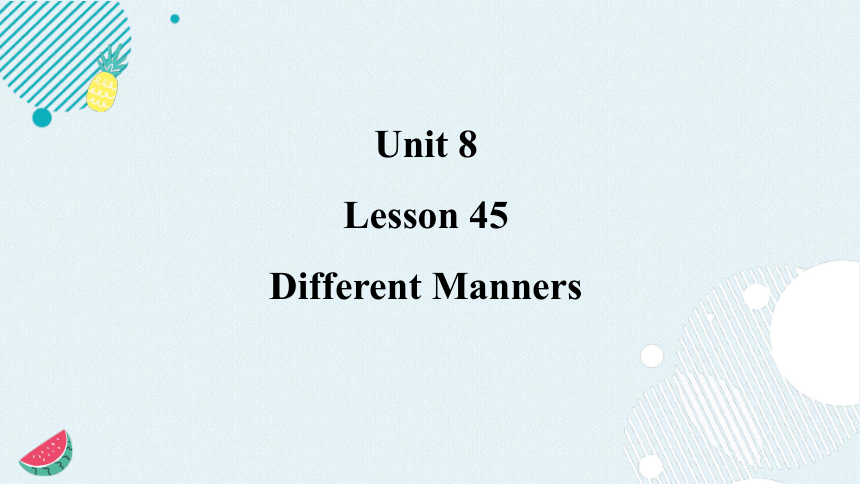 | |
| 格式 | pptx | ||
| 文件大小 | 6.3MB | ||
| 资源类型 | 教案 | ||
| 版本资源 | 冀教版 | ||
| 科目 | 英语 | ||
| 更新时间 | 2024-08-02 21:45:26 | ||
图片预览



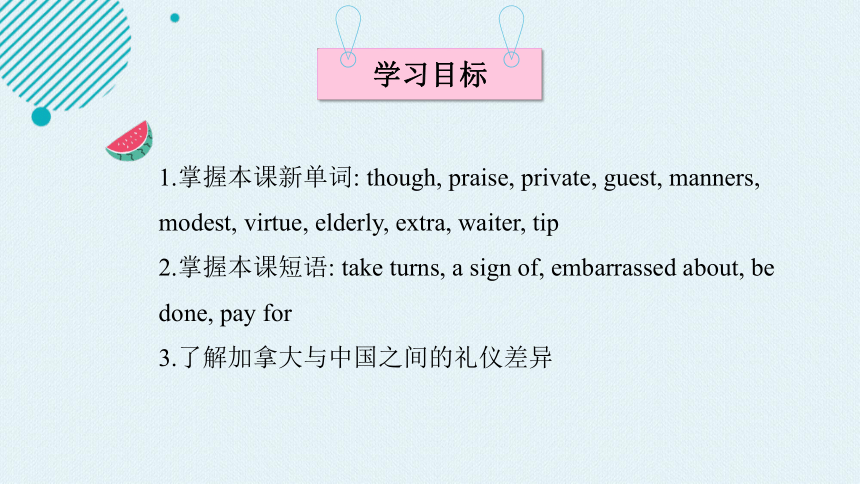
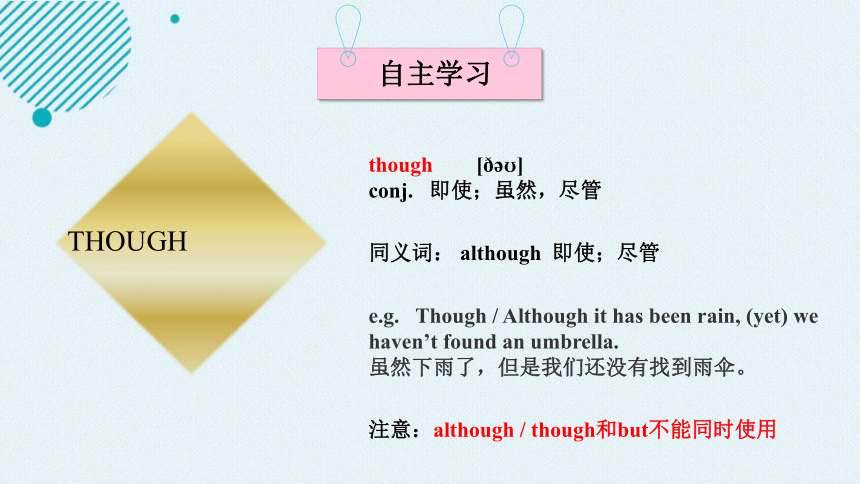
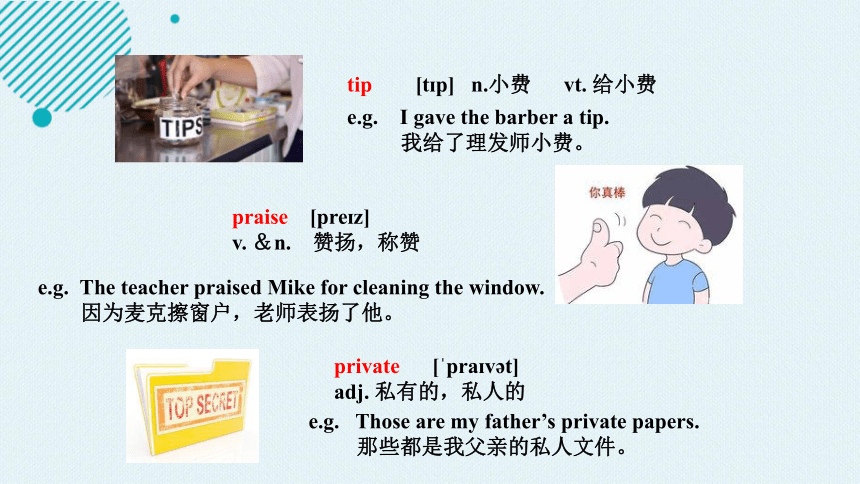
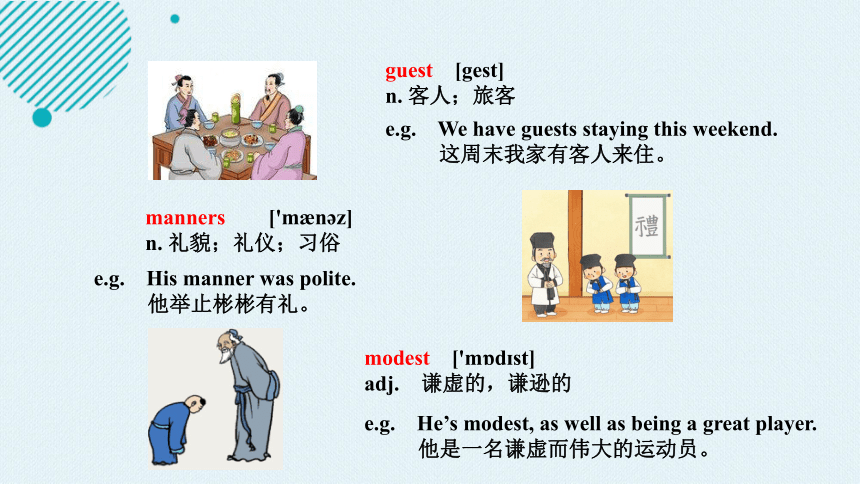
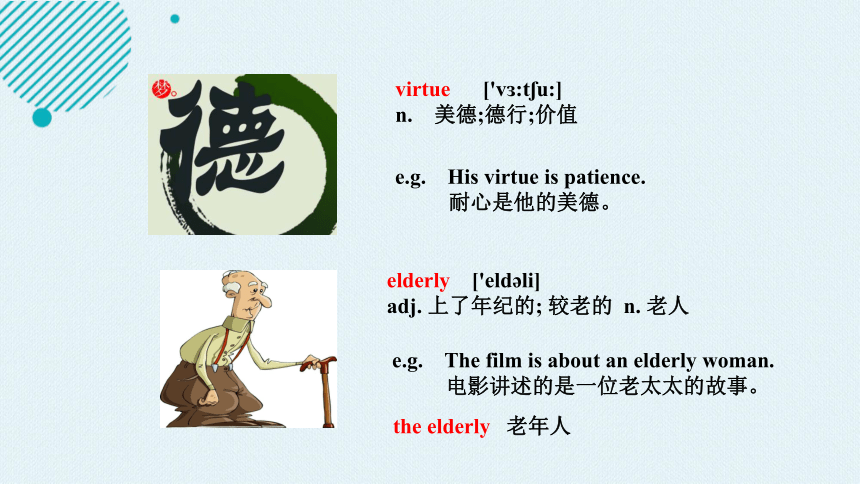
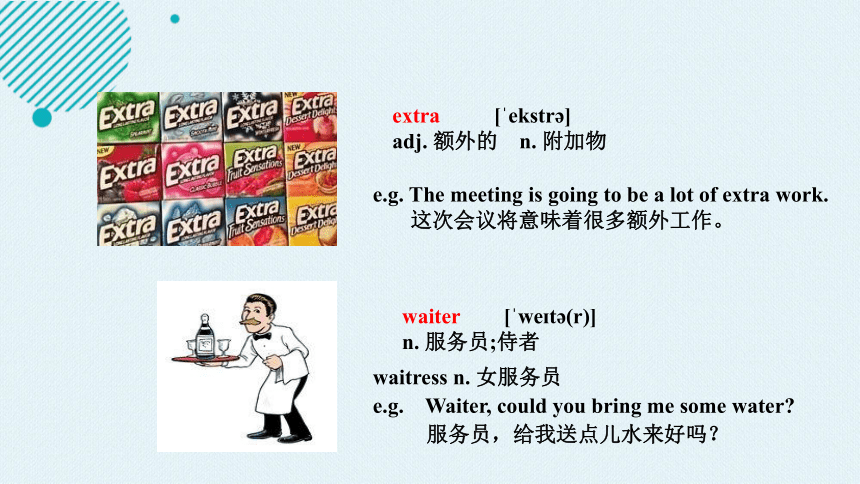
文档简介
(共25张PPT)
Unit 8
Lesson 45
Different Manners
1.学习目标
3.重点探究
2.自主学习
学习导航
5.当堂检测
6.课堂总结
4.拓展提升
新课导入
How much do you know about different manners in different countries
kiss on the cheek
bow
shake hands
namaste(合十礼)
学习目标
1.掌握本课新单词: though, praise, private, guest, manners, modest, virtue, elderly, extra, waiter, tip
2.掌握本课短语: take turns, a sign of, embarrassed about, be done, pay for
3.了解加拿大与中国之间的礼仪差异
自主学习
though [ ]
conj. 即使;虽然,尽管
同义词: although 即使;尽管
e.g. Though / Although it has been rain, (yet) we haven’t found an umbrella.
虽然下雨了,但是我们还没有找到雨伞。
THOUGH
注意:although / though和but不能同时使用
tip [t p] n.小费 vt. 给小费
e.g. I gave the barber a tip.
我给了理发师小费。
e.g. The teacher praised Mike for cleaning the window.
因为麦克擦窗户,老师表扬了他。
praise [pre z]
v. &n. 赞扬,称赞
private [ pra v t]
adj. 私有的,私人的
e.g. Those are my father’s private papers.
那些都是我父亲的私人文件。
guest [gest]
n. 客人;旅客
e.g. We have guests staying this weekend.
这周末我家有客人来住。
manners ['m n z]
n. 礼貌;礼仪;习俗
e.g. His manner was polite.
他举止彬彬有礼。
modest ['m d st]
adj. 谦虚的,谦逊的
e.g. He’s modest, as well as being a great player.
他是一名谦虚而伟大的运动员。
virtue ['v :t u:]
n. 美德;德行;价值
the elderly 老年人
elderly ['eld li]
adj. 上了年纪的; 较老的 n. 老人
e.g. The film is about an elderly woman.
电影讲述的是一位老太太的故事。
e.g. His virtue is patience.
耐心是他的美德。
extra [ ekstr ]
adj. 额外的 n. 附加物
e.g. The meeting is going to be a lot of extra work.
这次会议将意味着很多额外工作。
waitress n. 女服务员
e.g. Waiter, could you bring me some water
服务员,给我送点儿水来好吗?
waiter [ we t (r)]
n. 服务员;侍者
重点探究
In your opinion, what are you good manners
Do you think cultures shape manners
Is it a good manner
Why do you think so
My name is Wu Zhou, I have lived in Canada for twenty-three years. In Canada, I call myself Joe Wu. Joe is an English name that sounds like Zhou.
Though I have lived here for a long time, I still don’t feel Canadian. This is probably because North American manners and Chinese manners are so different.
In China, being modest is a virtue, If someone praises you and says that your English is excellent, you should be modest and say, “No, no. My English is still poor.”
I have many good friends in Canada, though Canadian culture is different from Chinese culture.
But in North America, this is usually a sign of being weak and not confident. You should just say, “thank you.”
In Canada, people only ask children about their age. It’s not polite to ask an adult’s age. They think it is private. But this is common in many places in China.
In both China and North America, it is polite to offer an elderly person a seat on the bus. In North America, however, an elderly person may feel embarrassed about being offered a seat.
When Chinese people eat out in restaurants they may take turns paying for the meal. In Canada, however, people often share the cost of a meal.
In China, if your guests have no food on their plates, it’s polite to put food on their plates. In Canada, you pass food to guests, but you don’t usually put food on their plates.
In China, people seldom give extra money to waiters, waitresses, taxi drivers or hotel workers. In North America , this is always done. It is called “tipping”.
It’s interesting to experience two different cultures. I think understanding cultural differences really helps us to understand each other,live together and work together.
1 Read the lesson and match the behaviours with the correct countries.
China
Canada
asking an adult’ s age
putting food on a guest’ s plate
giving a tip to waiters and hotel workers
sharing the cost of a meal in a restaurant
Let's Do It!
2 Match and complete the sentences.
Although people have different cultures and customs,
Brian hasn’t been to China,
He has been at the new school for only a few days,
Though Liu Feng has many friends in America,
but he has already made many friends there.
they have the same feelings.
he still feels lonely.
but he knows a lot about our country.
Let's Do It!
Note that we should not use “although/though” and “but” together in the same sentence.
3 Fill in the blanks with the words or phrases in the box.
1.We should ________ little Debbie for her courage.
2.It's a long way. We can ____________ driving.
3.They asked him to ________ the damage,but he refused.
4.Don't talk about other people's ________ things. It's not polite.
5.Jack is a ________ man who is admired by many people.
praise
take turns
pay for
private
modest
Let's Do It!
pay for praise take turns modest private
4 What cultural differences,besides the ones already discussed,have you noticed between China and English speaking countries Share your ideas with your classmates.
Let's Do It!
Different
manners
greeting,parting
table manners
festivals
receiving
gifts
teaching
system
invitation
拓展提升
1. take turns 依次,轮流表达
take turns doing sth./ take turns to do sth.轮流做某事
还可以搭配介词at, in, on或about
e.g. We took turns taking /to take care of my grandparents.
我们家人轮流照顾我的祖父母。
We take turns in cleaning the classrooms.
我们轮流打扫教室。
2. a sign of 一个迹象;一种标志
e.g. The involvement of the foreign ministers was itself a sign of progress.
外交部长的介入本身就是取得进展的一个标志。
拓展:as a sign of 以示
as a sign of respect 以示尊敬
as a sign of loyalty 以示效忠
3. embarrassed about sth. 对……感到尴尬
4. be done 做;完毕
embarrass vt.& vi. (使)窘迫,(使)局促不安;
e.g. I was embarrassed about what had happened.
我对发生的事情感到尴尬。
e.g. We must see what can be done.
我们应该看看有什么能做的。
What is the next thing to be done
其次要做的事是什么?
5. pay for 赔偿; 为……付钱;
e.g. I have to pay for repairs to the house.
我不得不支付房屋维修费用。
(1)pay 支付,作为及物动词,宾语可以是“人”、“钱”。
e.g. He paid the taxi and hurried to the station.
他付了出租车的钱,急忙向车站赶去。
(2)pay for 宾语为“物”、“事”,for表示支付的原因。
e.g. You’ll have to pay me ten dollars a week for your meals.
你得每周付给我十美元饭钱。
当堂检测
一、根据所提示单词或汉语填空。
1. It’ s a long way. We can ___________ (轮流)driving.
2. The teacher ________ ( praise )Mike for cleaning the window yesterday.
3. Don’ t talk about other people’ s ________ (私人的)things. It’ s not polite.
4. Jack is a _______ (谦虚的)man who is admired by many people.
5. The involvement of the foreign ministers was itself ___________(一种标志) progress.
praised
take turns
a sign of
private
modest
二、根据汉语提示完成句子。
1.这张桌子与那张桌子不同。
This desk ________ ________ ________ that one.
2.这些书我现在不能付款。
I can't ________ ________ the books now.
3.让我们轮流打扫这个房间吧。
Let's ________ ________ at cleaning the room.
4.他要求私下见总经理。
He asks to see the managing director ________ ________.
5.他们两个不是都喜欢踢球。弟弟喜欢弹钢琴。
________ ________of them like playing football. The
younger brother likes ________ the piano.
is different from
pay for
take turns
in private
Not both
playing
课堂总结
Unit 8
Lesson 45
1.掌握本课新单词: though, praise, private, guest, manners, modest, virtue, elderly, extra, waiter, tip
2.掌握本课短语: take turns, a sign of, embarrassed about, be done, pay for
3.了解加拿大与中国之间的礼仪差异
Unit 8
Lesson 45
Different Manners
1.学习目标
3.重点探究
2.自主学习
学习导航
5.当堂检测
6.课堂总结
4.拓展提升
新课导入
How much do you know about different manners in different countries
kiss on the cheek
bow
shake hands
namaste(合十礼)
学习目标
1.掌握本课新单词: though, praise, private, guest, manners, modest, virtue, elderly, extra, waiter, tip
2.掌握本课短语: take turns, a sign of, embarrassed about, be done, pay for
3.了解加拿大与中国之间的礼仪差异
自主学习
though [ ]
conj. 即使;虽然,尽管
同义词: although 即使;尽管
e.g. Though / Although it has been rain, (yet) we haven’t found an umbrella.
虽然下雨了,但是我们还没有找到雨伞。
THOUGH
注意:although / though和but不能同时使用
tip [t p] n.小费 vt. 给小费
e.g. I gave the barber a tip.
我给了理发师小费。
e.g. The teacher praised Mike for cleaning the window.
因为麦克擦窗户,老师表扬了他。
praise [pre z]
v. &n. 赞扬,称赞
private [ pra v t]
adj. 私有的,私人的
e.g. Those are my father’s private papers.
那些都是我父亲的私人文件。
guest [gest]
n. 客人;旅客
e.g. We have guests staying this weekend.
这周末我家有客人来住。
manners ['m n z]
n. 礼貌;礼仪;习俗
e.g. His manner was polite.
他举止彬彬有礼。
modest ['m d st]
adj. 谦虚的,谦逊的
e.g. He’s modest, as well as being a great player.
他是一名谦虚而伟大的运动员。
virtue ['v :t u:]
n. 美德;德行;价值
the elderly 老年人
elderly ['eld li]
adj. 上了年纪的; 较老的 n. 老人
e.g. The film is about an elderly woman.
电影讲述的是一位老太太的故事。
e.g. His virtue is patience.
耐心是他的美德。
extra [ ekstr ]
adj. 额外的 n. 附加物
e.g. The meeting is going to be a lot of extra work.
这次会议将意味着很多额外工作。
waitress n. 女服务员
e.g. Waiter, could you bring me some water
服务员,给我送点儿水来好吗?
waiter [ we t (r)]
n. 服务员;侍者
重点探究
In your opinion, what are you good manners
Do you think cultures shape manners
Is it a good manner
Why do you think so
My name is Wu Zhou, I have lived in Canada for twenty-three years. In Canada, I call myself Joe Wu. Joe is an English name that sounds like Zhou.
Though I have lived here for a long time, I still don’t feel Canadian. This is probably because North American manners and Chinese manners are so different.
In China, being modest is a virtue, If someone praises you and says that your English is excellent, you should be modest and say, “No, no. My English is still poor.”
I have many good friends in Canada, though Canadian culture is different from Chinese culture.
But in North America, this is usually a sign of being weak and not confident. You should just say, “thank you.”
In Canada, people only ask children about their age. It’s not polite to ask an adult’s age. They think it is private. But this is common in many places in China.
In both China and North America, it is polite to offer an elderly person a seat on the bus. In North America, however, an elderly person may feel embarrassed about being offered a seat.
When Chinese people eat out in restaurants they may take turns paying for the meal. In Canada, however, people often share the cost of a meal.
In China, if your guests have no food on their plates, it’s polite to put food on their plates. In Canada, you pass food to guests, but you don’t usually put food on their plates.
In China, people seldom give extra money to waiters, waitresses, taxi drivers or hotel workers. In North America , this is always done. It is called “tipping”.
It’s interesting to experience two different cultures. I think understanding cultural differences really helps us to understand each other,live together and work together.
1 Read the lesson and match the behaviours with the correct countries.
China
Canada
asking an adult’ s age
putting food on a guest’ s plate
giving a tip to waiters and hotel workers
sharing the cost of a meal in a restaurant
Let's Do It!
2 Match and complete the sentences.
Although people have different cultures and customs,
Brian hasn’t been to China,
He has been at the new school for only a few days,
Though Liu Feng has many friends in America,
but he has already made many friends there.
they have the same feelings.
he still feels lonely.
but he knows a lot about our country.
Let's Do It!
Note that we should not use “although/though” and “but” together in the same sentence.
3 Fill in the blanks with the words or phrases in the box.
1.We should ________ little Debbie for her courage.
2.It's a long way. We can ____________ driving.
3.They asked him to ________ the damage,but he refused.
4.Don't talk about other people's ________ things. It's not polite.
5.Jack is a ________ man who is admired by many people.
praise
take turns
pay for
private
modest
Let's Do It!
pay for praise take turns modest private
4 What cultural differences,besides the ones already discussed,have you noticed between China and English speaking countries Share your ideas with your classmates.
Let's Do It!
Different
manners
greeting,parting
table manners
festivals
receiving
gifts
teaching
system
invitation
拓展提升
1. take turns 依次,轮流表达
take turns doing sth./ take turns to do sth.轮流做某事
还可以搭配介词at, in, on或about
e.g. We took turns taking /to take care of my grandparents.
我们家人轮流照顾我的祖父母。
We take turns in cleaning the classrooms.
我们轮流打扫教室。
2. a sign of 一个迹象;一种标志
e.g. The involvement of the foreign ministers was itself a sign of progress.
外交部长的介入本身就是取得进展的一个标志。
拓展:as a sign of 以示
as a sign of respect 以示尊敬
as a sign of loyalty 以示效忠
3. embarrassed about sth. 对……感到尴尬
4. be done 做;完毕
embarrass vt.& vi. (使)窘迫,(使)局促不安;
e.g. I was embarrassed about what had happened.
我对发生的事情感到尴尬。
e.g. We must see what can be done.
我们应该看看有什么能做的。
What is the next thing to be done
其次要做的事是什么?
5. pay for 赔偿; 为……付钱;
e.g. I have to pay for repairs to the house.
我不得不支付房屋维修费用。
(1)pay 支付,作为及物动词,宾语可以是“人”、“钱”。
e.g. He paid the taxi and hurried to the station.
他付了出租车的钱,急忙向车站赶去。
(2)pay for 宾语为“物”、“事”,for表示支付的原因。
e.g. You’ll have to pay me ten dollars a week for your meals.
你得每周付给我十美元饭钱。
当堂检测
一、根据所提示单词或汉语填空。
1. It’ s a long way. We can ___________ (轮流)driving.
2. The teacher ________ ( praise )Mike for cleaning the window yesterday.
3. Don’ t talk about other people’ s ________ (私人的)things. It’ s not polite.
4. Jack is a _______ (谦虚的)man who is admired by many people.
5. The involvement of the foreign ministers was itself ___________(一种标志) progress.
praised
take turns
a sign of
private
modest
二、根据汉语提示完成句子。
1.这张桌子与那张桌子不同。
This desk ________ ________ ________ that one.
2.这些书我现在不能付款。
I can't ________ ________ the books now.
3.让我们轮流打扫这个房间吧。
Let's ________ ________ at cleaning the room.
4.他要求私下见总经理。
He asks to see the managing director ________ ________.
5.他们两个不是都喜欢踢球。弟弟喜欢弹钢琴。
________ ________of them like playing football. The
younger brother likes ________ the piano.
is different from
pay for
take turns
in private
Not both
playing
课堂总结
Unit 8
Lesson 45
1.掌握本课新单词: though, praise, private, guest, manners, modest, virtue, elderly, extra, waiter, tip
2.掌握本课短语: take turns, a sign of, embarrassed about, be done, pay for
3.了解加拿大与中国之间的礼仪差异
同课章节目录
- Unit 7 Work for Peace
- Lesson 37 Don't Fight!
- Lesson 38 Making School a Better Place
- Lesson 39 The Dove and the Olive Branch
- Lesson 40 The UN—Power of Words
- Lesson 41 Jenny's Good Advice
- Lesson 42 Peace at Last
- Unit Review
- Unit 8 Culture Shapes Us
- Lesson 43 A Visit to Chinatown
- Lesson 44 Popular Sayings
- Lesson 45 Different Manners
- Lesson 46 Home to Many Cultures
- Lesson 47 Good Manners
- Lesson 48 Supper with the Bradshaws
- Unit Review
- Unit 9 Communication
- Lesson 49 Get Along with Others
- Lesson 50 Tips for Good Communication
- Lesson 51 What Could Be Wrong?
- Lesson 52 The Power of a Smile
- Lesson 53 Working in Groups
- Lesson 54 How Embarrassing!
- Unit Review
- Unit 10 Get Ready for the Future
- Lesson 55 Look into the Future
- Lesson 56 Manage Your Time
- Lesson 57 Best Wishes
- Lesson 58 Ms.Liu's Speech
- Lesson 59 Keep Your Choices Open
- Lesson 60 Get a Good Education
- Unit Review
